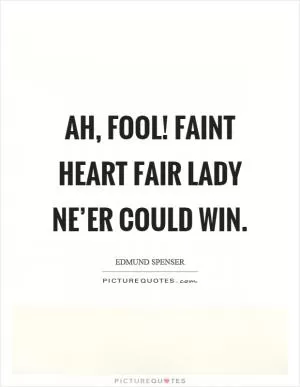For if good were not praised more than ill, none would chuse goodness of his own free will

For if good were not praised more than ill, none would chuse goodness of his own free will
The quote “For if good were not praised more than ill, none would chuse goodness of his own free will” holds significant meaning in the context of Edmund Spenser’s works, particularly in his epic poem “The Faerie Queene.” Spenser was a devout Christian and his writing often reflects his belief in the importance of virtue and morality. In “The Faerie Queene,” Spenser explores the themes of good versus evil, virtue versus vice, and the triumph of righteousness over wickedness.The quote suggests that praise and recognition of goodness are essential in motivating individuals to choose to do good deeds. Without the acknowledgment and celebration of virtuous actions, people may be less inclined to act in a moral and righteous manner. Spenser’s characters in “The Faerie Queene” often face moral dilemmas and must make choices between good and evil. The poem serves as a moral guide, encouraging readers to strive for goodness and righteousness in their own lives.
Throughout “The Faerie Queene,” Spenser praises and celebrates the virtues of his noble knights and heroines. Characters such as Redcrosse, Una, and Britomart embody qualities such as courage, loyalty, chastity, and righteousness. These characters are praised for their virtuous actions and serve as examples for readers to emulate. By highlighting the positive attributes of his characters, Spenser encourages his audience to choose goodness and strive for moral excellence.
Spenser’s belief in the power of praise and recognition to inspire virtuous behavior is evident in his portrayal of the Redcrosse Knight. Despite facing numerous challenges and temptations, the Redcrosse Knight remains steadfast in his commitment to righteousness. His actions are praised and celebrated by other characters in the poem, reinforcing the importance of choosing goodness over evil.












 Friendship Quotes
Friendship Quotes Love Quotes
Love Quotes Life Quotes
Life Quotes Funny Quotes
Funny Quotes Motivational Quotes
Motivational Quotes Inspirational Quotes
Inspirational Quotes